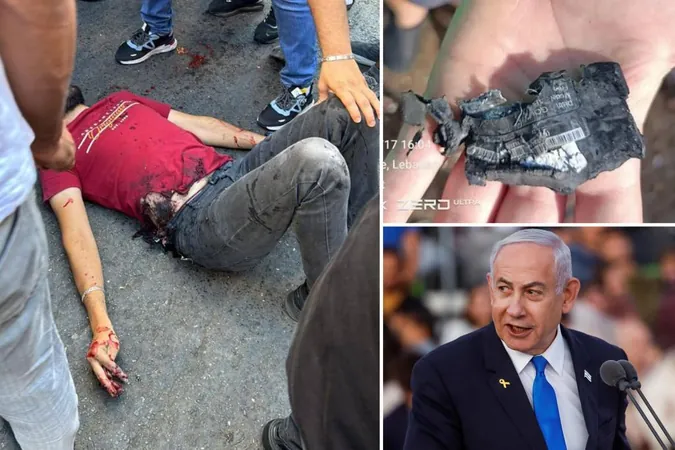
Netanyahu's Controversial Approval of Devastating Pager Attacks on Hezbollah Revealed
2024-11-11
Author: Ting
Netanyahu's Controversial Approval of Devastating Pager Attacks on Hezbollah Revealed
In a shocking disclosure, Israeli Prime Minister Benjamin Netanyahu has confirmed he authorized the unprecedented and deadly pager attacks against the Hezbollah terrorist organization, which took place on September 17. This revelation came to light during a cabinet meeting and has raised numerous questions about the scope of military strategy employed by Israel.
According to statements from Netanyahu’s office, the Prime Minister faced opposition from high-ranking defense officials and political figures who were concerned about the potential ramifications of such a bold operation. However, he insisted on moving forward with the plan to deploy thousands of weaponized pagers across Hezbollah strongholds in Lebanon.
During the meeting, Netanyahu stated, “The pager operation and the elimination of [Hezbollah leader Hassan] Nasrallah were carried out despite the opposition of senior officials.” This indicates a decisive shift in Israel's tactics against Hezbollah, which has faced increasing tensions and military challenges in recent months.
The operation involved the simultaneous detonation of thousands of pagers, leading to widespread chaos in Beirut and other areas known to harbor Hezbollah militants. Tragically, the attack resulted in 39 fatalities and injured over 3,400 others, many of whom were directly associated with the militant group.
Eyewitness accounts describe horror as the pagers, alongside hundreds of walkie-talkies that detonated the following day, began to heat and explode in the hands or pockets of their unsuspecting owners, triggered by incoming message alerts. This method of attack was particularly devastating as it targeted individuals who had adhered to Hezbollah's directive against carrying cell phones, which they deemed risky for their operational security.
In response to the assault, Hezbollah promptly condemned it as “Israeli aggression,” with vows of retaliation for what they labeled a brutal strike. Hezbollah chief Hassan Nasrallah termed the attacks a “declaration of war,” further escalating tensions between the militant group and Israel. A Hezbollah official noted that this operation was treated as the “biggest security breach” the group had faced in years, suggesting it could significantly alter their operational methods moving forward.
As the situation continues to unfold, observers are left wondering about the implications of such an aggressive military tactic. Will this lead to a new phase in the enduring conflict between Israel and Hezbollah, and what might the repercussions be for regional stability? Only time will tell as both sides brace for possible retaliatory actions that could heighten an already volatile environment.



 Brasil (PT)
Brasil (PT)
 Canada (EN)
Canada (EN)
 Chile (ES)
Chile (ES)
 España (ES)
España (ES)
 France (FR)
France (FR)
 Hong Kong (EN)
Hong Kong (EN)
 Italia (IT)
Italia (IT)
 日本 (JA)
日本 (JA)
 Magyarország (HU)
Magyarország (HU)
 Norge (NO)
Norge (NO)
 Polska (PL)
Polska (PL)
 Schweiz (DE)
Schweiz (DE)
 Singapore (EN)
Singapore (EN)
 Sverige (SV)
Sverige (SV)
 Suomi (FI)
Suomi (FI)
 Türkiye (TR)
Türkiye (TR)